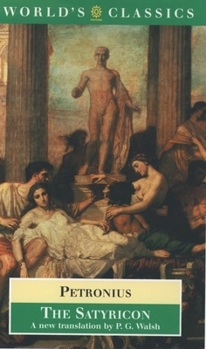The Satyricon
Select Format
Select Condition 
Book Overview
The Satyricon is the most celebrated prose work to have survived from the ancient world. It can be described as the first realistic novel, the father of the picaresque genre. It recounts the sleazy progress of a pair of literate scholars as they wander through the cities of the southern Mediterranean in the age of Nero, encountering en route type-figures whom the author wishes to satirize. P.G. Walsh captures the spirit of the original in this new...
Format:Paperback
Language:English
ISBN:0192839527
ISBN13:9780192839527
Release Date:August 1999
Publisher:Oxford University Press, USA
Length:272 Pages
Weight:0.45 lbs.
Dimensions:0.6" x 7.5" x 5.0"
Age Range:18 years and up
Grade Range:Postsecondary and higher
Customer Reviews
4 ratings
Not for the squeamish, but very amusing
Published by Thriftbooks.com User , 22 years ago
This is all that remains of what was apparently a much longer work - unless Petronius' allusions to lost episodes of the text are merely for effect, which they might be. The best known of the surviving sections is "Trimalchio's Dinner-party", which is devoted to a description of a vulgar and opinionated self-made man with much more money than sense or learning. The satire is razor-sharp. The book revolves around the misadventures of Encolpius (who is impotent), his lover Ascyltus, and Giton, for whose sexual favours the two of them quarrel bitterly. No account of the book would be quite complete with mentioning that little detail; so let the buyer beware. After Encolpius and Ascyltus split up, Encolpius and Giton fall in with Eumolpus, who is a thorough con man and generally a complete scoundrel. And of the same tastes as the others. Petronius drops his characters in one compromising situation after another - and leaves them to get themselves out. Warmly recommended for the social comedy. And not pornographic.
A classic that should still be read....
Published by Thriftbooks.com User , 23 years ago
This book, when, as here it is translated well (i.e. in a fashion that renders it valid to a modern reader as opposed to one in which it is more a word-for-word translation from the Latin), is one of the funniest books of which I know. Roman literature typically seems derivative-- less real, less well-thought out than Greek stuff-- this book is one of the major exceptions to this rule.If you know of this book and want to read it, this translation here is a good place to start. This is the first novel (whatever that means!), and just an all-around good time....
Passive-Aggressive Humour and Satire
Published by Thriftbooks.com User , 24 years ago
Petronius's "Satyricon" is, loosely defined, the story of Encolpius's odyssey through the Mediterranean world of the first century AD. Encolpius is a freeman and a scholar, whose distaste for popular culture, and disrespect for other people's privacy leads him into a strange, twisted, sexually disorienting series of misadventures.The action of the plot commences when Encolpius stumbles upon a secret ritual performed by followers of Priapus, the Roman god of lust. In the context of other ancient novels, I think it is extremely important to note that the god who spurs the hero's wanderings is not Eros, the god of love, but Priapus, a perhaps degenerate form of Eros. Rendered impotent by the angry god, Encolpius begins experiencing external complications as well. Encolpius's lover, the boy Giton, and his best friend Ascyltus get into repeated quarrels over Giton's preference of partner: Encolpius or Ascyltus.For a mere boy, Giton is presented throughout the "Satyricon" as its most shrewd and interesting character. He lurks on the peripheries of the main action, yet the reader can clearly perceive his manipulative actions, as he takes the side in any argument or dispute of the party most likely to win, switching camps at a moment's notice. In the dissolute moral background of Roman imperial society, Giton is shown to be the best at "doing as the Romans do".As a curse-born eunuch, Encolpius roams about with Giton and the bombastic, and epically terrible poet Eumolpus, trying to restore himself to full masculinity. Along the way, Petronius presents us with a range of different critiques. The most impressive of these episodic satires is the oft-cited chapter five, "Dinner with Trimalchio". In it, we see a largesse, a gluttony, whose perversions are so outlandish, that we join with Ascyltus in laughing at it, while we secretly revel in its unquestionable splendor. The excesses of this chapter can be seen as a model for the "Satyricon" itself: conversations begin and end on a whim; like Trimalchio, Petronius as author can be clearly felt in guiding the course of events. Trimalchio's restroom breaks are like those times in the narrative where Petronius himself seems to take breaks from the actual plot, as in Eumolpus's extended and inane epic poem on the Roman civil war. In any event, with all its literary styles, parodic forms, and its stubborn refusal to be simply categorized, the "Satyricon," even fragmentary as it is, is a fabulous text. Although some of the colloquialisms he uses are beginning to show signs of advancing age, William Arrowsmith's translation, almost fifty years after initial publication, is still lively and engaging English for a 21st century crowd.
Great text for first-time exposure to "true" Latin
Published by Thriftbooks.com User , 25 years ago
For those students who are learning Latin, and want to begin working on real texts, this book is perfect. By using the simpler sections of Petronius, and incorporating grammatical help for each section, this book allows the Latin student to work through the text with only a moderate level of difficulty. Though this work should not be used to replace an instructional text on the Latin language for those who are in the first phases of instruction, this text is appropriate for any second year student.






